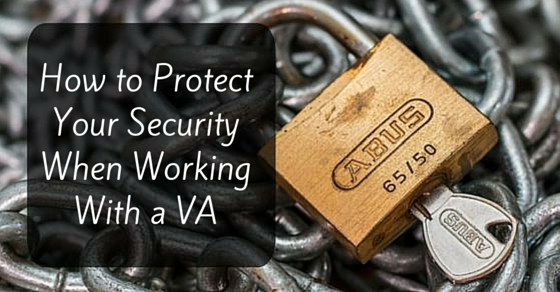Privacy – How to Keep Your Friends Close and Your Passwords Closer!
How we protect your valuables
We live in an age of suspicion, protection and prevention. We exist in a culture that cultivates and, unfortunately, seems to thrive on fear and skepticism. There are indeed hundreds of professions which feed upon these deep-seated fears: security firms of every flavor prosper worldwide, high priced lawyers write ironclad contracts to protect your intellectual property, and insurance firms have lengthy and impossible-to-understand policies protecting you from thievery. These days, we are even concerned about identity theft. Someone can assume our persona and potentially not only steal our assets but also spout libel that can reflect badly on us both professionally and personally.
Given these (legitimate) misgivings, how could you consider handing over your personal information – even access to your inbox, financials, contact list, database, publications, social media network – to someone who lives and works thousands of miles away?
FEAR NOT!
We live in the same world you do, and have given these challenges considerable thought and attention. We have developed several solutions to assuage your inevitable concerns about working virtually:
1. Rigorous screening and reference checking process
First, we are exceedingly selective about whom we choose to represent our firm. You can find out more about our recruitment and screening process here, but in short, we have been told that we have “impossible” standards, and we turn down more than 95% of the hopefuls who apply to work for our company. This produces several results. First, our turnover rate is exceptionally low. Our hiring process is lengthy and we do that very much by design, partly in order to vet out those who entertain working as a Virtual Assistant as a stopgap measure in between other professions. Ultimately, those who are successful in our process are so because they champion the idea of being a VA.
In addition, we are fortunate to be governed by the labor laws of Israel, which are decidedly more flexible in terms of what can be asked on a reference check. We do not send a form letter or a postcard asking for confirmation on dates of employment and title; we want to chat with former supervisors, live. We confirm with several former employers that the candidate is trustworthy, capable, detailed and holds not only an enviable work ethic, but a high ethical and moral standard as well. Once you are interviewing one of our Virtual Assistants, you can rest assured that she has been thoroughly scrutinized and approved.
2. Two layers of Confidentiality Agreements
In order to come aboard with us, our Virtual Assistants are required to sign an employment agreement, which includes provisions designed to protect our company and each of its clients from disclosure of confidential information or use thereof for any purpose other than serving our clients. In addition to signing the agreement with our firm, many of our clients have instituted their own nondisclosure or confidentiality agreements that the Virtual Assistant signs upon onboarding with them. We are happy to provide such an agreement free of charge to our clients, although many have authored their own.
3. Access Limitation
No one said you need to (or should!) hand over everything to your Virtual Assistant. While many of our clients simply give their email username and password to their VA, plenty do not. Your Virtual Assistant, even without access to your inbox if you prefer, can absolutely handle all of your scheduling and correspondence. You can set up a filter within your inbox to automatically forward any email with specified keywords (lunch, dinner, coffee, meeting, phone, conference call, schedule) to your VA. In addition, you can manually forward any applicable scheduling request to her for management and follow-up. Most of our clients have their VA’s name, email address and phone number as part of their signature, with a line that simply states “for appointments please contact”. That way, the executive is bypassed completely and does not waste time nor energy on scheduling.
When it comes to financial access, we are very specific about the responsibilities we empower our employees to manage, and those we do not. For example, your Virtual Assistant can absolutely have access to your credit card number (most clients do give their VA a corporate card to work with for travel planning and procurement) as credit cards always have fraud protection measures built in. Our VAs also often make purchases on their client’s behalf via PayPal. Why? Because the owner of a PayPal account gets a notification every single time there is a transaction performed within their account. We do not, however, take on accounting assignments. Our VA’s do not reconcile accounts nor work within QuickBooks, nor do they directly access a client’s bank account. We carefully select the responsibilities for which we are comfortable taking responsibility.
4. Current and former client roster
Oftentimes, before a new client comes on board with us, he or she will request a conversation (or five) with other current or former clients. Have at it! We will contact clients who are most similar to your industry, or perhaps who currently work with the Virtual Assistant the potential client is considering, to get a personal recommendation. No one earns a dime on any of this – it’s just satisfied clients recommending a service that they trust.
5. Earning trust and confidence
Working with any assistant is part selection and part skill, but mostly trust. We recognize that trust needs to be earned, and this takes time. We are in it for the long haul, and encourage new clients to begin slowly with their Virtual Assistant, initially delegating smaller tasks and working up to transferring considerable responsibility as the relationship progresses. You will get to know your Virtual Assistant just as you would come to know any employee on your staff. You will speak regularly and she will learn not only the ins and outs of your business, but your style, your preferences and your idiosyncrasies. Eventually, she becomes your right hand.
We are realists and very serious when it comes to protecting your privacy. As you can see, there are several measures in place to keep your information exactly and only where it needs to be.
 Submission by Hilary
Submission by Hilary

